《论语》英译
- 格式:ppt
- 大小:237.50 KB
- 文档页数:17
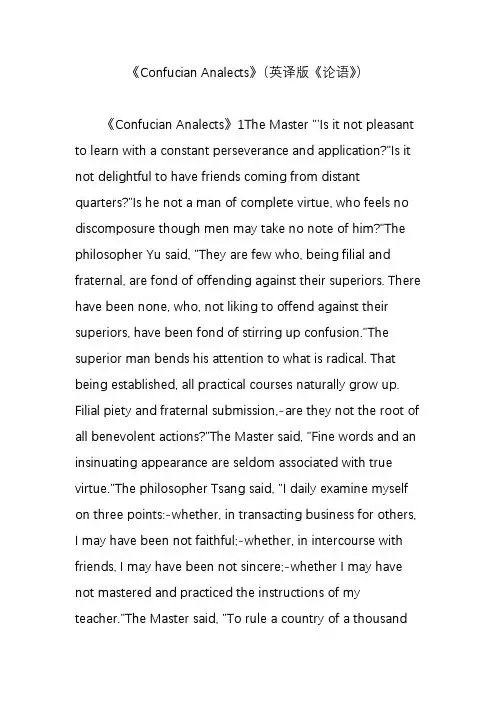
《Confucian Analects》(英译版《论语》)《Confucian Analects》1The Master "'Is it not pleasant to learn with a constant perseverance and application?"Is it not delightful to have friends coming from distant quarters?"Is he not a man of complete virtue, who feels no discomposure though men may take no note of him?"The philosopher Yu said, "They are few who, being filial and fraternal, are fond of offending against their superiors. There have been none, who, not liking to offend against their superiors, have been fond of stirring up confusion."The superior man bends his attention to what is radical. That being established, all practical courses naturally grow up. Filial piety and fraternal submission,-are they not the root of all benevolent actions?"The Master said, "Fine words and an insinuating appearance are seldom associated with true virtue."The philosopher Tsang said, "I daily examine myself on three points:-whether, in transacting business for others, I may have been not faithful;-whether, in intercourse with friends, I may have been not sincere;-whether I may have not mastered and practiced the instructions of my teacher."The Master said,"To rule a country of a thousand chariots, there must be reverent attention to business, and sincerity; economy in expenditure, and love for men; and the employment of the people at the proper seasons."The Master said, "A youth, when at home, should be filial, and, abroad, respectful to his elders. He should be earnest and truthful. He should overflow in love to all, and cultivate the friendship of the good. When he has time and opportunity, after the performance of these things, he should employ them in polite studies."Tsze-hsia said, "If a man withdraws his mind from the love of beauty, and applies it as sincerely to the love of the virtuous; if, in serving his parents, he can exert his utmost strength; if, in serving his prince, he can devote his life; if, in his intercourse with his friends, his words are sincere:-although men say that he has not learned, I will certainly say that he has.The Master said, "If the scholar be not grave, he will not call forth any veneration, and his learning will not be solid."Hold faithfulness and sincerity as first principles."Have no friends not equal to yourself."When you have faults, do not fear to abandon them."The philosopher Tsang said, "Let there be a careful attention to perform the funeral rites to parents, and letthem be followed when long gone with the ceremonies of sacrifice;-then the virtue of the people will resume its proper excellence."Tsze-ch'in asked Tsze-kung saying, "When our master comes to any country, he does not fail to learn all about its government. Does he ask his information? or is it given to him?"Tsze-kung said, "Our master is benign, upright, courteous, temperate, and complaisant and thushe gets his information. The master's mode of asking information,-is it not different from that of other men?"The Master said, "While a man's father is alive, look at the bent of his will; when his father is dead, look at his conduct. If for three years he does not alter from the way of his father, he may be called filial."The philosopher Yu said, "In practicing the rules of propriety, a natural ease is to be prized. In the ways prescribed by the ancient kings, this is the excellent quality, and in things small and great we follow them."Yet it is not to be observed in all cases. If one, knowing how such ease should be prized, manifests it, without regulating it by the rules of propriety, this likewise is not to be done."The philosopher Yu said, "When agreements are made according to what is right, what is spoken can be made good. When respect is shown according to what isproper, one keeps far from shame and disgrace. When the parties upon whom a man leans are proper persons to be intimate with, he can make them his guides and masters."The Master said, "He who aims to be a man of complete virtue in his food does not seek to gratify his appetite, nor in his dwelling place does he seek the appliances of ease; he is earnest in what he is doing, and careful in his speech; he frequents the company of men of principle that he may be rectified:-such a person may be said indeed to love to learn."Tsze-kung said, "What do you pronounce concerning the poor man who yet does not flatter, and the rich man who s not proud?" The Master replied, "They will do; but they are not equal to him, who, though poor, is yet cheerful, and to him, who, though rich, loves the rules of propriety."Tsze-kung replied, "It is said in the Book of Poetry, 'As you cut and then file, as you carve and then polish.'-The meaning is the same, I apprehend, as that which you have just expressed."The Master said, "With one like Ts'ze, I can begin to talk about the odes. I told him one point, and he knew its proper sequence."The Master said, "I will not be afflicted at men's not knowing me;I will be afflicted that I do not know men." 2The Mastersaid, "He who exercises government by means of his virtue may be compared to the north polar star, which keeps its place and all the stars turn towards it."The Master said, "In the Book of Poetry are three hundred pieces, but the design of them all may be embraced in one sentence'Having no depraved thoughts.'"The Master said, "If the people be led by laws, and uniformity sought to be given them by punishments, they will try to avoid the punishment, but have no sense of shame."If they be led by virtue, and uniformity sought to be given them by the rules of propriety, they will have the sense of shame, and moreover will become good."The Master said, "At fifteen, I had my mind bent on learning."At thirty, I stood firm."At forty, I had no doubts."At fifty, I knew the decrees of Heaven."At sixty, my ear was an obedient organ for the reception of truth."At seventy, I could follow what my heart desired, without transgressing what was right."Mang I asked what filial piety was. The Master said, "It is not being disobedient."Soon after, as Fan Ch'ih was driving him, the Master told him, saying, "Mang-sun asked me what filial piety was, and I answered him,-'not being disobedient.'"Fan Ch'ih said, "What did you mean?" The Master replied, "That parents,when alive, be served according to propriety; that, when dead, they should be buried according to propriety; and that they should be sacrificed to according to propriety."Mang Wu asked what filial piety was. The Master said, "Parents are anxious lest their children should be sick."Tsze-yu asked what filial piety was. The Master said, "The filial piety nowadays means the support of one's parents. But dogs and horses likewise are able to do something in the way of support;-without reverence, what is there to distinguish the one support given from the other?"Tsze-hsia asked what filial piety was. The Master said, "The difficulty is with the countenance. If, when their elders have any troublesome affairs, the young take the toil of them, and if, when the young have wine and food, they set them before their elders, is THIS to be considered filial piety?"The Master said, "I have talked with Hui for a whole day, and he has not made any objection to anything I said;-as if he were stupid. He has retired, and I have examined his conduct when away from me, and found him able to illustrate my teachings. Hui!-He is not stupid."The Master said, "See what a man does."Mark his motives."Examine in what things he rests."How can a manconceal his character? How can a man conceal his character?"The Master said, "If a man keeps cherishing his old knowledge, so as continually to be acquiring new, he may be a teacher of others."The Master said, "The accomplished scholar is not a utensil."Tsze-kung asked what constituted the superior man. The Master said, "He acts before he speaks, and afterwards speaks according to his actions."The Master said, "The superior man is catholic and not partisan. The mean man is partisan and not catholic."The Master said, "Learning without thought is labor lost; thought without learning is perilous."The Master said, "The study of strange doctrines is injuriousindeed!"The Master said, "Yu, shall I teach you what knowledge is? When you know a thing, to hold that you know it; and when you do not know a thing, to allow that you do not know it;-this is knowledge."Tsze-chang was learning with a view to official emolument.The Master said, "Hear much and put aside the points of which you stand in doubt, while you speak cautiously at the same time of the others:-then you will afford few occasions for blame. See much and put aside the things which seem perilous, while you are cautiousat the same time in carrying the othersinto practice: then you will have few occasions for repentance. When one gives few occasions for blame in his words, and few occasions for repentance in his conduct, he is in the way to get emolument."The Duke Ai asked, saying, "What should be done in order to secure the submission of the people?" Confucius replied, "Advance the upright and set aside the crooked, then the people will submit. Advance the crooked and set aside the upright, then the people will not submit."Chi K'ang asked how to cause the people to reverence their ruler, to be faithful to him, and to go on to nerve themselves to virtue. The Master said, "Let him preside over them with gravity;-then they will reverence him. Let him be final and kind toall;-then they will be faithful to him. Let him advance the good and teach the incompetent;-then they will eagerly seek to be virtuous."Some one addressed Confucius, saying, "Sir, why are you not engaged in the government?"The Master said, "What does the Shu-ching say of filial piety?-'You are final, you discharge your brotherly duties. These qualities are displayed in government.' This then also constitutes the exercise of government. Why must there be THAT-making one be inthe government?"The Master said, "I do not know how a man without truthfulness is to get on. How can a large carriage be made to go without the crossbar for yoking the oxen to, or a small carriage without the arrangement for yoking the horses?"Tsze-chang asked whether the affairs of ten ages after could be known.Confucius said, "The Yin dynasty followed the regulations of the Hsia: wherein it took from or added to them may be known. The Chau dynasty has followed the regulations of Yin: wherein it took from or added to them may be known. Some other may follow the Chau, but though it should be at the distance of a hundred ages, its affairs may be known."The Master said, "For a man to sacrifice to a spirit which does not belong to him is flattery."To see what is right and not to do it is want of courage." About the Tao"[The] words are (in the traditional Buddhist metaphor) fingers pointing toward the moon; if you watch the fingers you can't see the moon."-Stephen Mitchell Just as multiple satellites are neededto triangulate a gps signal side-by-side chapter-by-chapter translations can help you understand the text's meaning. Zen does not confuse spirituality with thinking about God while one is peeling the potatoes. Zen spirituality is just topeel the potatoes" -Alan WattsSelect a Translator· 1880 - D.T. Suzuki & Paul Carus· 1884 - Frederic H Balfour· 1891 - James Legge· 1919 - Dwight Goddard& Henri Borel· 1955 - R. B. Blakney· 1963 - D. C. Lau· 1988 - Stephen Mitchell· 1989 - Jane English & Gia-fu Feng· 1993 - S. Addiss & S. Lombardo· 1996 - J. H. McDonald· 2004 - Ron Hogan 1REASON'S REALIZATION. 1. The Reason that can be reasoned is not the eternal Reason. The name that can be named is not the eternal Name. The Unnamable is of heaven and earth the beginning. The Namable becomes of the ten thousand things the mother.Therefore it is said:2. "He who desireless is foundThe spiritual of the world will sound.But he who by desire is boundSees the mere shell of things around."3. These two things are the same in source but different in name. Their sameness is called a mystery. Indeed, it is the mystery of mysteries. Of all spirituality it is thedoor.2SELF-CULTURE.1. Everywhere it is obvious that if beauty makes a display of beauty, it is sheer ugliness. It is obvious that if goodness makes a display of goodness, it issheer badness. For2. "To be and not to be are mutually conditioned.The difficult, the easy, are mutually definitioned.The long, the short, are mutually exhibitioned.Above, below, are mutually cognitioned.The sound, the voice, are mutually coalitioned.Before and after are mutually positioned."3. ThereforeThe holy man abides by non-assertion in his affairs and conveys by silence his instruction. When the ten thousand things arise, verily, he refuses them not. He quickens but owns not. He acts but claims not. Merit he accomplishes, but he does not dwell on it."Since he does not dwell on itIt will never leave him."3KEEPING THE PEOPLE QUIET.1. Not boasting of one's worth forestalls people's envy.Not prizing treasures difficult to obtain keeps people from committing theft.2. Not contemplating what kindles desire keeps the heart unconfused.3. Therefore the holy man when he governs empties the people's hearts but fills their stomachs. He weakens their ambition but strengthens their bones. Always he keeps the people unsophisticated and without desire. He causes that the crafty do not dare to act. When he acts with non-assertion there is nothingungoverned.4SOURCELESS.1. Reason is empty, but its use is inexhaustible. In its profundity, verily, it resembleth the arch-father of the ten thousand things.2. "It will blunt its own sharpness,Will its tangles adjust;It will dim its own radianceAnd be one with its dust."3. Oh, how calm it seems to remain! I know not whose son it is. Apparently even the Lord it precedes.5THE FUNCTION OF EMPTINESS. 1. But for heaven and earth's humaneness, the ten thousand things are straw dogs. But for the holy man's humaneness, the hundred families are straw dogs. 2. Is not the space between heaven and earth like unto a bellows? It is empty; yet it collapses not. It moves, and more and more comes forth. [But]3. "How soon exhausted isA gossip's fulsome talk!And should we not preferOn the middle path to walk?"6THE COMPLETION OF FORM.1. "The valley spirit not expires,Mysterious woman ’tis called by the sires.The mysterious woman's door, to boot,Is called of heaven and earth the root.Forever and aye it seems to endureAnd its use is without effort sure."7DIMMING RADIANCE.1. Heaven endures and earth is lasting. And why can heaven and earth endure and be lasting? Because they do not live for themselves. On that account can they endure.2. ThereforeThe holy man puts his person behind and his person comes to the front. He surrenders his person and his person is preserved. Is it not because he seeks not his own? For that reason he can accomplish his own.8EASY BY NATURE.1. Superior goodness resembleth water. The water's goodness benefiteth the ten thousand things, yet it quarreleth not.2. Water dwelleth in the places which the multitudes of men shun; therefore it is near unto the eternal Reason3. The dwelling of goodness is in lowliness. The heart of goodness is in commotion. When giving, goodness showeth benevolence. In words, goodness keepeth faith. In government goodness standeth for order. In business goodness exhibiteth ability. The movements of goodness keep time.4. It quarreleth not. Therefore it is not rebuked.9PRACTISING PLACIDITY.1. Grasp to the full, are you not likely foiled? Scheme too sharply, can you wear long? If gold and jewels fill the hall no one can protectit.2. Rich and high but proud, brings about its own doom. To accomplish merit and acquire fame, then to withdraw, that is Heaven's Way.10WHAT CAN BE DONE?1. Who by unending discipline of the senses embraces unity cannot be disintegrated. By concentrating his vitality and inducing tenderness he can become like a little child. By purifying, by cleansing and profound intuition he can be free from faults.2. Who loves the people when administering the country will practise nonassertion.Opening and closing the gates of heaven, he will be like a mother-bird; bright, and white, and penetrating the four quarters, he will be unsophisticated. He quickens them and feeds them. He quickens but owns not. He acts but claims not. He excels but rules not. This is called profound virtue.11THE FUNCTION OF THE NON-EXISTENT.1. Thirty spokes unite in one nave and on that which is non-existent [on the hole in the nave] depends the wheel's utility. Clay is moulded into a vessel and on that which is non-existent [on its hollowness] depends the vessel's utility. By cutting out doors and windows we build a house and on that which is non-existent [on the empty space within] depends the house's utility.2. Therefore, existence renders actual butnon-existence renders useful.12ABSTAINING FROM DESIRE. 1. "The five colors [combined] the human eye will blind;The five notes [in one sound] the human ear confound; The five tastes [when they blend] the human mouth offend."2. "Racing and hunting will human hearts turn mad, Treasures high-prized make human conduct bad."3. ThereforeThe holy man attends to the inner and not to the outer. He abandons the latter and chooses theformer.13LOATHING SHAME. 1. "Favor bodes disgrace; it is like trembling.Rank bodes great heartache. It is like the body."2. What means "Favor bodes disgrace; it is like trembling?"Favor humiliates. Its acquisition causes trembling, its loss causes trembling. This is meant by "Favor bodes disgrace; it is like trembling."3. What means "Rank bodes great heartache, it is like the body?"I suffer great heartache because I have a body. When I have no body, what heartache remains?4. Therefore who administers the empire as he takes care of his body can be entrusted with the empire.14PRAISING THE MYSTERIOUS.1. We look at Reason and do not see it; its name is Colorless. We listen to Reason and do nothear it; its name is Soundless. We grope for Reason and do not grasp it; its name is Bodiless.2. These three things cannot further be analyzed. Thus they are combined and conceived as a unity which on its surface is not clear and in its depth not obscure.3. Forever and aye Reason remains unnamable, and again and again it returns home tonon-existence.4. This is called the form of the formless, the image of the imageless. This is called the transcendentally abstruse.5. In front its beginning is not seen. In the rear its end is not seen.6. By holding fast to the Reason of the ancients, the present is mastered and the origin of the past understood. This is called Reason's clue.15THE REVEALERS OF VIRTUE.1. Those of yore who have succeeded in becoming masters are subtile, spiritual, profound, and penetrating. On account of their profundity they can not be understood. Because they can not be understood, therefore I endeavor to make them intelligible.2. How cautious they are! Like men in winter crossing a river. How reluctant! Like men fearing in the four quarters their neighbors. How reserved! They behave like guests. How elusive! They resemble ice when melting. How simple! They resemble rough wood. How empty! Theyresemble the valley. How obscure! They resemble troubled waters.3. Who by quieting can gradually render muddy waters clear? Who by stirring can gradually quicken the still?4. He who cherishes this Reason is not anxious to be filled. Since he is not filled, therefore he may grow old; without renewal he is complete.16RETURNING TO THE ROOT.1. By attaining the height of abstraction we gain fulness of rest.2. All the ten thousand things arise, and I see them return. Now they bloom in bloom but each one homeward returneth to its root.3. Returning to the root means rest. It signifies the return according to destiny. Return according to destiny means the eternal. Knowing the eternal means enlightenment. Not knowing the eternal causes passions to rise; and that is evil.4. Knowing the eternal renders comprehensive. Comprehensiveness renders broad. Breadth renders royal. Royalty renders heavenly. Heaven renders Reason-like. Reason renders lasting. Thus the decay of the body implies nodanger.17SIMPLICITY IN HABITS.1. Of great rulers the subjects do not notice the existence. To lesser ones people are attached; they praise them. Still lesser ones people fear, and the meanest ones people despise.2. For itis said:"If your faith be insufficient, verily, you will receive no faith."3. How reluctantly they [the great rulers] considered their words! Merit they accomplished; deeds they performed; and the hundred families thought: "We are independent."18THE PALLIATION OF VULGARITY.1. When the great Reason is obliterated, we have benevolence and justice. Prudence and circumspection appear, and we have much hypocrisy.2. When family relations no longer harmonize, we have filial piety and paternal devotion. When the country and the clans decay through disorder, we have loyalty andallegiance.19RETURNING TO SIMPLICITY.1. Abandon your saintliness; put away your prudence; and the people will gain a hundredfold!2. Abandon your benevolence; put away your justice; and the people will return to filial piety and paternal devotion.3. Abandon smartness; give up greed; and thieves and robbers will no longer exist.4. These are three things for which culture is insufficient. Therefore it is said:"Hold fast to that which will endure, Show thyself simple, preserve thee pure,And lessen self with desires fewer."20DIFFERENT FROM THE VULGAR.1. Abandon learnedness, and you have novexation. The "yes" compared with the "yea," how little do they differ! But the good compared with the bad, how much do they differ!2. If what the people dread cannot be made dreadless, there will be desolation, alas! and verily, there will be no end of it.3. The multitudes of men are happy, so happy, as though celebrating a great feast. They are as though in springtime ascending a tower. I alone remain quiet, alas! like one that has not yet received an omen. I am like unto a babe that does not yet smile.4. Forlorn am I, O so forlorn! It appears that I have no place whither I may return home.5. The multitude of men all have plenty and I alone appear empty. Alas! I am a man whose heart is foolish.6. Ignorant am I, O, so ignorant! Common people are bright, so bright, I alone am dull.7. Common people are smart, so smart, I alone am confused, so confused.8. Desolate am I, alas! like the sea. Adrift, alas! like one who has no place where to stay.9. The multitude of men all possess usefulness. I alone am awkward and a rustic too. I alone differ from others, but I prize seeking sustenance from our mother.。
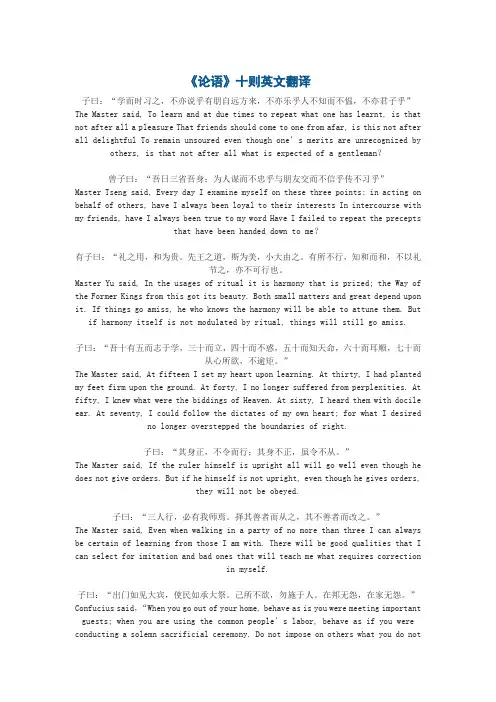
《论语》十则英文翻译子曰:“学而时习之,不亦说乎有朋自远方来,不亦乐乎人不知而不愠,不亦君子乎”The Master said, To learn and at due times to repeat what one has learnt, is that not after all a pleasure That friends should come to one from afar, is this not after all delightful To remain unsoured even though one’s merits are unrecognized by others, is that not after all what is expected of a gentleman?曾子曰:“吾日三省吾身:为人谋而不忠乎与朋友交而不信乎传不习乎”Master Tseng said, Every day I examine myself on these three points: in acting on behalf of others, have I always been loyal to their interests In intercourse with my friends, have I always been true to my word Have I failed to repeat the preceptsthat have been handed down to me?有子曰:“礼之用,和为贵。
先王之道,斯为美,小大由之。
有所不行,知和而和,不以礼节之,亦不可行也。
Master Yu said, In the usages of ritual it is harmony that is prized; the Way of the Former Kings from this got its beauty. Both small matters and great depend upon it. If things go amiss, he who knows the harmony will be able to attune them. But if harmony itself is not modulated by ritual, things will still go amiss.子曰:“吾十有五而志于学,三十而立,四十而不惑,五十而知天命,六十而耳顺,七十而从心所欲,不逾矩。
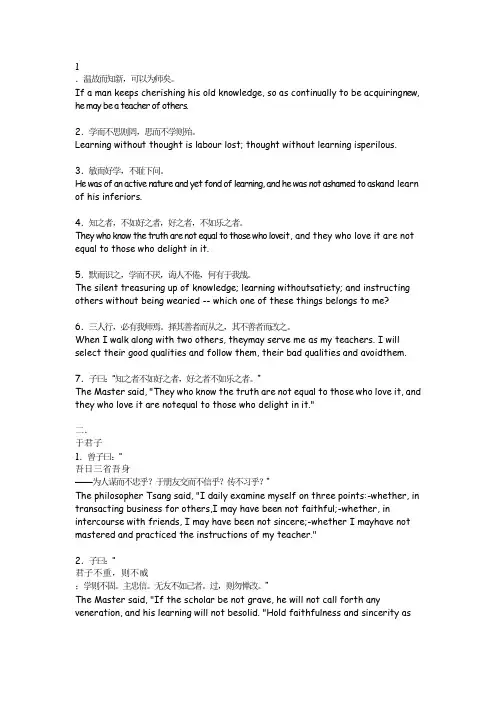
1.温故而知新,可以为师矣。
If a man keeps cherishing his old knowledge, so as continually to be acquiringnew, he may be a teacher of others.2.学而不思则罔,思而不学则殆。
Learning without thought is labour lost; thought without learning isperilous. 3.敏而好学,不耻下问。
He was of an active nature and yet fond of learning, and he was not ashamed to askand learn of his inferiors.4.知之者,不如好之者,好之者,不如乐之者。
They who know the truth are not equal to those who loveit, and they who love it are not equal to those who delight in it.5.默而识之,学而不厌,诲人不倦,何有于我哉。
The silent treasuring up of knowledge; learning withoutsatiety; and instructing others without being wearied -- which one of these things belongs to me? 6.三人行,必有我师焉。
择其善者而从之,其不善者而改之。
When I walk along with two others, theymay serve me as my teachers. I will select their good qualities and follow them, their bad qualities and avoidthem. 7.子曰:“知之者不如好之者,好之者不如乐之者。
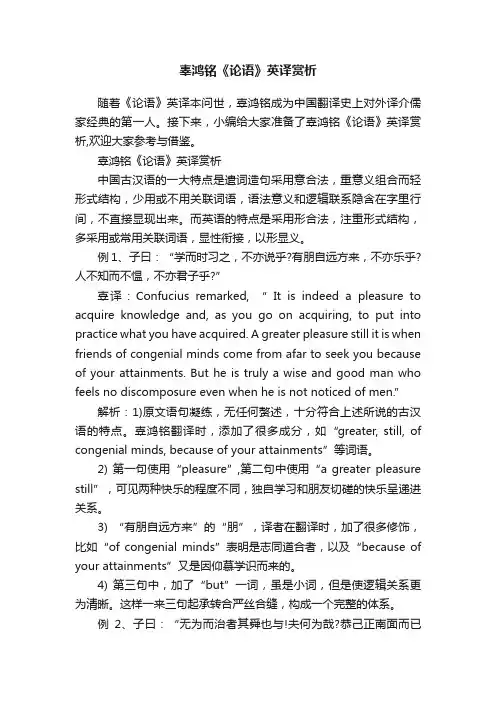
辜鸿铭《论语》英译赏析随着《论语》英译本问世,辜鸿铭成为中国翻译史上对外译介儒家经典的第一人。
接下来,小编给大家准备了辜鸿铭《论语》英译赏析,欢迎大家参考与借鉴。
辜鸿铭《论语》英译赏析中国古汉语的一大特点是遣词造句采用意合法,重意义组合而轻形式结构,少用或不用关联词语,语法意义和逻辑联系隐含在字里行间,不直接显现出来。
而英语的特点是采用形合法,注重形式结构,多采用或常用关联词语,显性衔接,以形显义。
例1、子曰:“学而时习之,不亦说乎?有朋自远方来,不亦乐乎?人不知而不愠,不亦君子乎?”辜译:Confucius remarked, “ It is indeed a pleasure to acquire knowledge and, as you go on acquiring, to put into practice what you have acquired. A greater pleasure still it is when friends of congenial minds come from afar to seek you because of your attainments. But he is truly a wise and good man who feels no discomposure even when he is not noticed of m en.”解析:1)原文语句凝练,无任何赘述,十分符合上述所说的古汉语的特点。
辜鸿铭翻译时,添加了很多成分,如“greater, still, of congenial minds, because of your attainments”等词语。
2) 第一句使用“pleasure”,第二句中使用“a greater pleasure still”,可见两种快乐的程度不同,独自学习和朋友切磋的快乐呈递进关系。
3) “有朋自远方来”的“朋”,译者在翻译时,加了很多修饰,比如“of congenial minds”表明是志同道合者,以及“because of your attainments”又是因仰慕学识而来的。

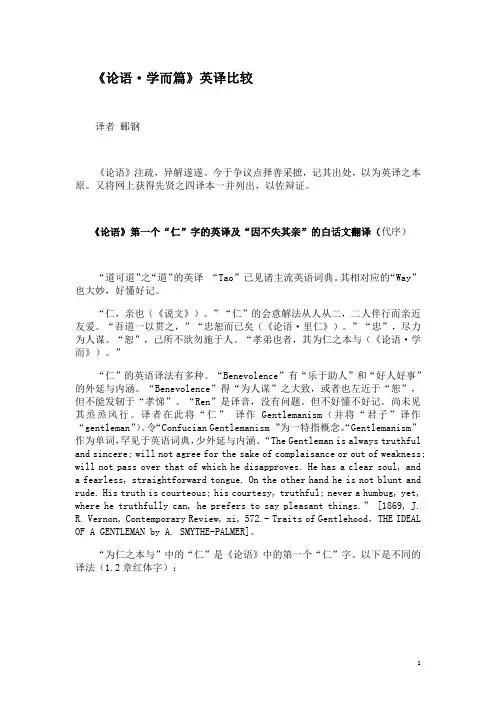
《论语·学而篇》英译比较译者郦钢《论语》注疏,异解遂遂。
今于争议点择善采摭,记其出处,以为英译之本原。
又将网上获得先贤之四译本一并列出,以佐辩证。
《论语》第一个“仁”字的英译及“因不失其亲”的白话文翻译(代序)“道可道”之“道”的英译“Tao”已见诸主流英语词典。
其相对应的“Way”也大妙,好懂好记。
“仁,亲也(《说文》)。
”“仁”的会意解法从人从二,二人伴行而亲近友爱。
“吾道一以贯之,”“忠恕而已矣(《论语·里仁》)。
”“忠”,尽力为人谋。
“恕”,己所不欲勿施于人。
“孝弟也者,其为仁之本与(《论语·学而》)。
”“仁”的英语译法有多种。
“Benevolence”有“乐于助人”和“好人好事”的外延与内涵。
“Benevolence”得“为人谋”之大致,或者也左近于“恕”,但不能发轫于“孝悌”。
“Ren”是译音,没有问题。
但不好懂不好记。
尚未见其烝烝风行。
译者在此将“仁”译作Gentlemanism(并将“君子”译作“gentleman”)。
令“Confucian Gentlemanism”为一特指概念。
“Gentlemanism”作为单词,罕见于英语词典,少外延与内涵。
“The Gentleman is always truthful and sincere; will not agree for the sake of complaisance or out of weakness; will not pass over that of which he disapproves. He has a clear soul, and a fearless, straightforward tongue. On the other hand he is not blunt and rude. His truth is courteous; his courtesy, truthful; never a humbug, yet, where he truthfully can, he prefers to say pleasant things.” [1869, J. R. Vernon, Contemporary Review, xi, 572.- Traits of Gentlehood,THE IDEAL OF A GENTLEMAN by A. SMYTHE-PALMER]。
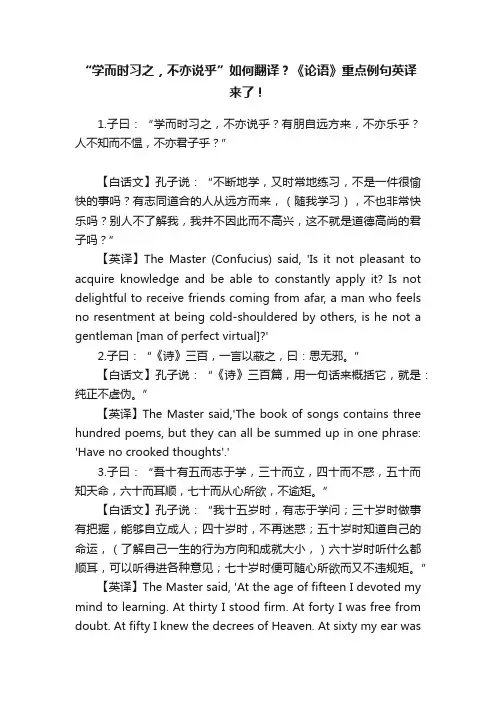
“学而时习之,不亦说乎”如何翻译?《论语》重点例句英译来了!1.子曰:“学而时习之,不亦说乎?有朋自远方来,不亦乐乎?人不知而不愠,不亦君子乎?”【白话文】孔子说:“不断地学,又时常地练习,不是一件很愉快的事吗?有志同道合的人从远方而来,(随我学习),不也非常快乐吗?别人不了解我,我并不因此而不高兴,这不就是道德高尚的君子吗?”【英译】The Master (Confucius) said, 'Is it not pleasant to acquire knowledge and be able to constantly apply it? Is not delightful to receive friends coming from afar, a man who feels no resentment at being cold-shouldered by others, is he not a gentleman [man of perfect virtual]?'2.子曰:“《诗》三百,一言以蔽之,曰:思无邪。
”【白话文】孔子说:“《诗》三百篇,用一句话来概括它,就是:纯正不虚伪。
”【英译】The Master said,'The book of songs contains three hundred poems, but they can all be summed up in one phrase: 'Have no crooked thoughts'.'3.子曰:“吾十有五而志于学,三十而立,四十而不惑,五十而知天命,六十而耳顺,七十而从心所欲,不逾矩。
”【白话文】孔子说:“我十五岁时,有志于学问;三十岁时做事有把握,能够自立成人;四十岁时,不再迷惑;五十岁时知道自己的命运,(了解自己一生的行为方向和成就大小,)六十岁时听什么都顺耳,可以听得进各种意见;七十岁时便可随心所欲而又不违规矩。
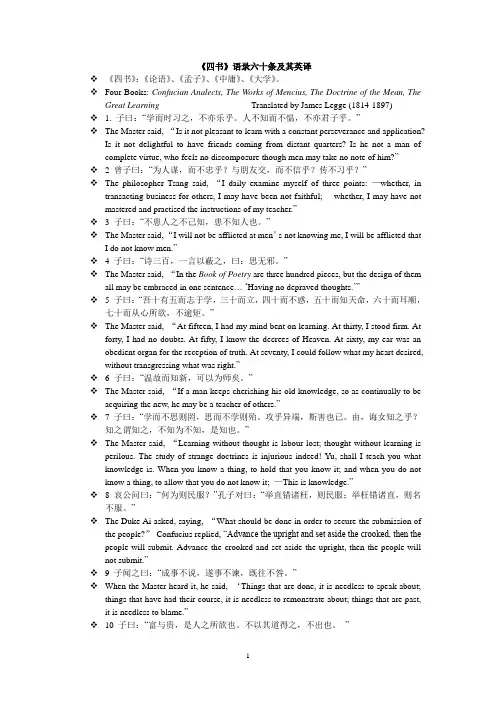
《四书》语录六十条及其英译《四书》:《论语》、《孟子》、《中庸》、《大学》。
Four Books: Confucian Analects, The Works of Mencius, The Doctrine of the Mean, The Great Learning Translated by James Legge (1814-1897)1. 子曰:“学而时习之,不亦乐乎。
人不知而不愠,不亦君子乎。
”The Master said, “Is it not pleasant to learn with a constant perseverance and application?Is it not delightful to have friends coming from distant quarters? Is he not a man of complete virtue, who feels no discomposure though men may take no note of him?”2 曾子曰:“为人谋,而不忠乎?与朋友交,而不信乎?传不习乎?”The philosopher Tsang said, “I daily examine myself of three points:—whether, in transacting business for others, I may have been not faithful; ---whether, I may have not mastered and practised the instructions of my teacher.”3 子曰:“不患人之不己知,患不知人也。
”The Master said, “I will not be afflicted at men’s not knowing me, I will be afflicted thatI do not know men.”4 子曰:“诗三百,一言以蔽之,曰:思无邪。
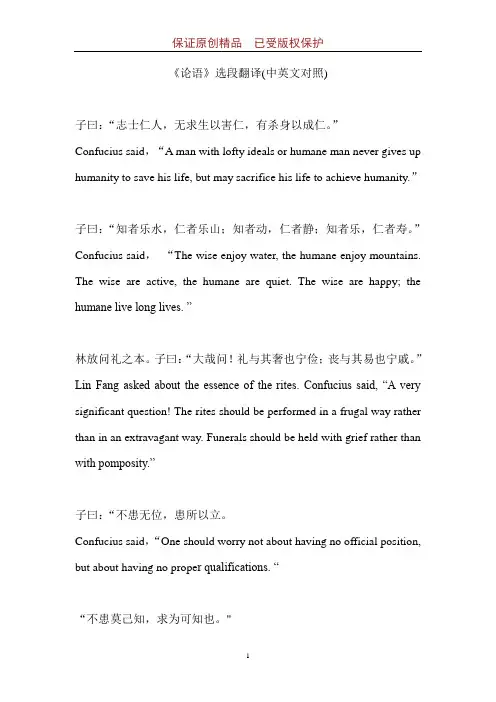
《论语》选段翻译(中英文对照)子曰:“志士仁人,无求生以害仁,有杀身以成仁。
”Confucius said,“A man with lofty ideals or humane man never gives up humanity to save his life, but may sacrifice his life to achieve humanity.”子曰:“知者乐水,仁者乐山;知者动,仁者静;知者乐,仁者寿。
”Confucius said,“The wise enjoy water, the humane enjoy mountains. The wise are active, the humane are quiet. The wise are happy; the humane live long lives. ”林放问礼之本。
子曰:“大哉问!礼与其奢也宁俭;丧与其易也宁戚。
”Lin Fang asked about the essence of the rites. Confucius said, “A very significant question! The rites should be performed in a frugal way rather than in an extravagant way. Funerals should be held with grief rather than with pomposity.”子曰:“不患无位,患所以立。
Confucius said,“One should worry not about having no official position, but about having no prope r qualifications. ““不患莫己知,求为可知也。
"”One should not seek to be known to others, but seek to acquire the qualities worthy of being known.”子曰:“人无远虑,必有近忧。

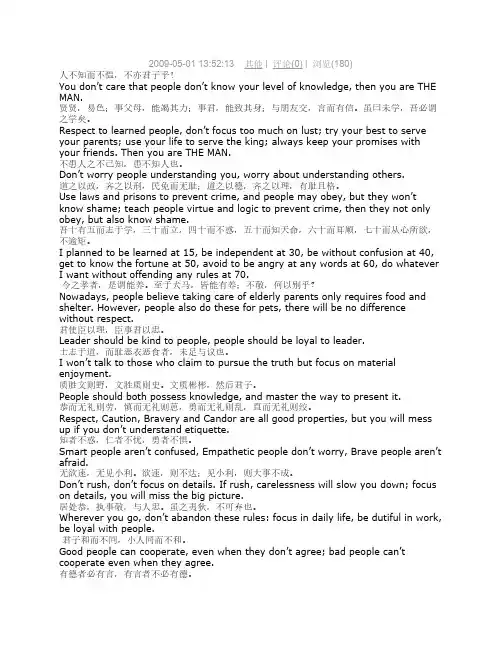
2009-05-01 13:52:13 其他 | 评论(0) | 浏览(180)人不知而不愠,不亦君子乎!You don’t care that people don’t know your level of knowledge, then you are THE MAN.贤贤,易色;事父母,能竭其力;事君,能致其身;与朋友交,言而有信。
虽曰未学,吾必谓之学矣。
Respect to learned people, don’t focus too much on lust; try your best to serve your parents; use your life to serve the king; always keep your promises with your friends. Then you are THE MAN.不患人之不己知,患不知人也。
Don’t worry people understanding you, worry about understanding others.道之以政,齐之以刑,民免而无耻;道之以德,齐之以理,有耻且格。
Use laws and prisons to prevent crime, and people may obey, but they won’t know shame; teach people virtue and logic to prevent crime, then they not only obey, but also know shame.吾十有五而志于学,三十而立,四十而不惑,五十而知天命,六十而耳顺,七十而从心所欲,不逾矩。
I planned to be learned at 15, be independent at 30, be without confusion at 40, get to know the fortune at 50, avoid to be angry at any words at 60, do whatever I want without offending any rules at 70.今之孝者,是谓能养。
人物语录:孔子语录(论语)中英文对照翻译AnalectsThe Master said, to learn and at due times to repeat what one has learned,is that not after all a pleasure? That friends should come to one from afar,is this not after all delightful? To remain unsoured even though one's merits are unrecognized by others, is that not after all what is expected of a gentleman?The Master said, “At fifteen I set my heart upon learning. At thirty, I planted my feet firm upon the ground. At forty, I no longer suffered from 2)perplexities。
At fifty, I knew what were the 3)biddings of Heaven. At sixty, I heard them with 4)docile ear。
At seventy, I could follow the 5)dictates of my own heart; for what I desired no longer overstepped the boundaries of right。
”The Master said, 6)incomparable indeed was Hui! A handful of rice to eat, a 7)gourdful of water to drink, living in a mean street. Others would have found it 8)unendurably depressing, but to Hui's cheerfulness it made no difference at all。
典籍英译课程案例以下是一个典籍英译课程的案例:原文:《论语》中的一段话:“学而时习之,不亦说乎?有朋自远方来,不亦乐乎?人不知而不愠,不亦君子乎?”英译:The Analects of Confucius says, "Isn't it a pleasure to learn and practice the truth in a timely manner? Isn't it a joy to have friends come from afar? Isn't it a gentleman not to be angry when others don't understand him?"翻译解析:这个译文基本上是正确的,准确地传达了原文的含义,但在表述的地道性方面可以继续提升。
1. “学而时习之,不亦说乎?”的译文由“Isn't it a pleasure to learn and practice the truth in a timely manner?”调整为“Isn't it delightful to learn and re-experience the truth at appropriate times?”,这样更符合英语表达习惯,更能传达原文的意境。
2. “有朋自远方来,不亦乐乎?”的译文由“Isn't it a joy to have friends come from afar?”调整为“Isn't it wonderful to have friends come from afar?”,这样更符合英语表达习惯,更能传达原文的意境。
3. “人不知而不愠,不亦君子乎?”的译文由“Isn't it a gentleman not to be angry when others don't understand him?”调整为“Isn't it the mark of a true gentleman not to be angered when others fail to appreciate him?”,这样更符合英语表达习惯,更能传达原文的意境。
《论语》英译Translation of Confucius’ The Analects 【译论专题】《论语》的重要地位及其英译本【论语原文选段之一】学而时习之【论语原文选段之二】三省吾身【论语原文选段之三】和为贵【论语原文选段之四】三十而立【论语原文选段之五】身正令行【论语原文选段之六】三人行必有我师【论语原文选段之七】己所不欲【论语原文选段之八】富贵、贫贱【论语原文选段之九】刚、毅、木、讷【论语原文选段之十】唯仁者能好人【论语原文选段之十一】杀身成仁【论语原文选段之十二】仁者乐山【论语原文选段之十三】礼之本【论语原文选段之十四】以礼让为国【论语原文选段之十五】宽、敬、哀【论语原文选段之十六】君子博学于文【论语原文选段之十七】入则孝,出则弟【论语原文选段之十八】父母在,不远游【论语原文选段之十九】四种忧虑【论语原文选段之二十】有益、有损之乐【论语原文选段之二十一】见贤思齐【论语原文选段之二十二】不患无位【论语原文选段之二十三】人无远虑,必有近忧【论语原文选段之二十四】自责与责人【论语原文选段之二十五】有过应改【论语原文选段之二十六】松柏后凋【论语原文选段之二十七】君子重义【论语原文选段之二十八】君子周而不比【论语原文选段之二十九】君子和而不同【论语原文选段之三十】君子坦荡荡【论语原文选段之三十一】欲速则不达【论语原文选段之三十二】有教无类【论语原文选段之三十三】性相近,习相远【论语原文选段之三十四】学与思【论语原文选段之三十五】温故知新【论语原文选段之三十六】匹夫不可夺志【论语原文选段之三十七】知与不知【论语原文选段之三十八】讷于言,敏于行【论语原文选段之三十九】言与行【论语原文选段之四十】人与言【论语原文选段之四十一】学而不厌,诲人不倦【论语原文选段之四十二】见义不为,无勇也【译论专题】《论语》的重要地位及其英译本《论语》是中国传统文化宝库中一颗最绚丽夺目的明珠。
早在距今两千四百多年前的春秋末年和战国初期,这颗明珠即已熠熠发光。
1.温故而知新,可以为师矣。
If a man keeps cherishing his old knowledge, so as continually to be acquiringnew, he may be a teacher of others.2.学而不思则罔,思而不学则殆。
Learning without thought is labour lost; thought without learning isperilous. 3.敏而好学,不耻下问。
He was of an active nature and yet fond of learning, and he was not ashamed to askand learn of his inferiors.4.知之者,不如好之者,好之者,不如乐之者。
They who know the truth are not equal to those who loveit, and they who love it are not equal to those who delight in it.5.默而识之,学而不厌,诲人不倦,何有于我哉。
The silent treasuring up of knowledge; learning withoutsatiety; and instructing others without being wearied -- which one of these things belongs to me? 6.三人行,必有我师焉。
择其善者而从之,其不善者而改之。
When I walk along with two others, theymay serve me as my teachers. I will select their good qualities and follow them, their bad qualities and avoidthem. 7.子曰:“知之者不如好之者,好之者不如乐之者。
子曰:「学而时习之, 不亦说乎。
有朋自远方来, 不亦乐乎。
人不知而不愠, 不亦君子乎」Confucius said: "Isn’t it a pleasure to study and practice what you have learned? Isn’t it also great when friends visit from distant places? If people do not recognize me and it doesn’t bother me, am I not a Superior Man?"子曰:「不患人之不己知, 患不知人也。
」Confucius said: "I am not bothered by the fact that I am unknown. I am bothered when I do not know others."子曰:「道之以政, 齐之以刑, 民免而无耻; 道之以德, 齐之以礼, 有耻且格。
」Confucius said: "If you govern the people legalistically and control them by punishment, they will avoid crime, but have no personal sense of shame. If you govern them by means of virtue and control them with propriety, they will gain their own sense of shame, and thus correct themselves."子曰:「吾十有五而志于学, 三十而立, 四十而不惑, 五十而知天命, 六十而耳顺, 七十而从心所欲, 不逾矩。
」Confucius said: "At fifteen my heart was set on learning; at thirty I stood firm; at forty I had no more doubts; at fifty I knew the mandate of heaven; at sixty my ear was obedient; at seventy I could follow my heart’s desire without transgressing the norm."子曰:「温故而知新, 可以为师矣。
中国古典文化佳作英译50首中国古典文化是世界上独一无二的宝藏,其中包含着许多经典的文学作品。
这些作品既展现了中国古代文人的智慧与才情,又传递了深厚的文化内涵。
为了让更多的人了解和欣赏中国古典文化,以下是50首脍炙人口的佳作的英译:1.《红楼梦》(Dream of the Red Chamber)2.《西游记》(Journey to the West)3.《水浒传》(Water Margin)4.《三国演义》(Romance of the Three Kingdoms)5.《论语》(The Analects of Confucius)6.《道德经》(Tao Te Ching)7.《诗经》(Book of Songs)8.《孙子兵法》(The Art of War)9.《资治通鉴》(Zizhi Tongjian)10.《岳阳楼记》(Memorandum of the Yueyang Tower)11.《醒世恒言》(A Lifelong Devotion to the Society)12.《十二钗》(The Twelve Beauties)13.《古文观止》(An Introduction to Classical Chinese)14.《孔子家语》(The Family Sayings of Confucius)15.《庄子》(Zhuangzi)17.《新唐书》(New Book of Tang)18.《老子》(Laozi)19.《文心雕龙》(Literary Mind and the Carving of Dragons)20.《史记》(Records of the Grand Historian)21.《道藏》(Taoist Canon)23.《尚书》(Book of Documents)24.《浮生六记》(Six Records of a Floating Life)25.《唐诗三百首》(Three Hundred Tang Poems)27.《明史》(History of Ming)28.《天演论》(Natural Law in the Spiritual World)29.《荣宗正谱》(Genealogy of the Worthy Linage)30.《镜花缘》(The Romance of the Rose)31.《弟子规》(Standards for Being a Good Student and Child)32.《神雕侠侣》(The Return of the Condor Heroes)33.《富春山居图》(Dwelling in the Fuchun Mountains)35.《幼学琼林》(Young Learning in the Jade Forest)36.《山海经》(Classic of Mountains and Seas)37.《齐民要术》(Important Techniques for the Welfare of the People)39.《太乙金华宗旨》(The Secret of the Golden Flower)40.《七祖文集》(The Platform Sutra of the Sixth Patriarch)41.《楚辞》(Chu Ci)42.《农桑辑要》(Essentials for Peasants and Mulberry Planters)43.《论衡》(Discourses Weighed in the Balance)45.《龙图腾》(Dragon Totem)46.《儿女英雄传》(The Heroes and Heroines)47.《神仙传》(Biographies of Divine Immortals)48.《净世瑜伽论》(Yoga of Purification and Enlightenment)49.《高阳台忆峡山》(Memories of Xia Mountain from the High Sun Terrace)50.《统一魏武昭王伐蜀记》(Account of King Wei Wu's Conquest of Shu)这些作品涵盖了中国古代文化的方方面面,无论是小说、诗歌、历史还是哲学,都有着卓越的贡献。